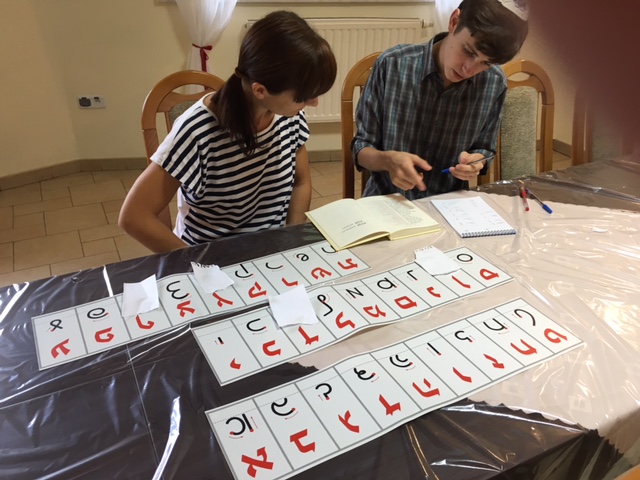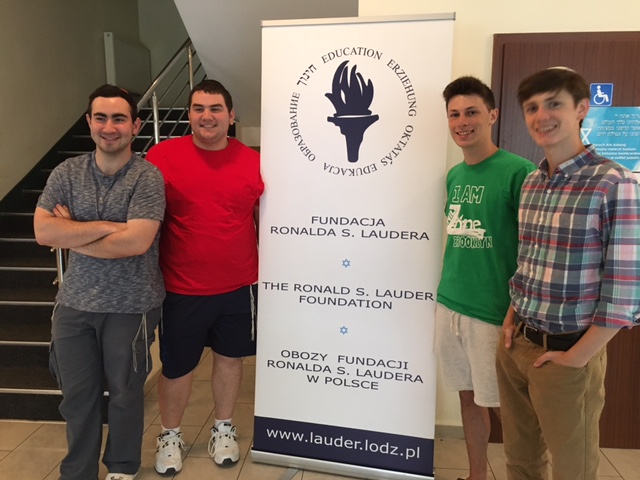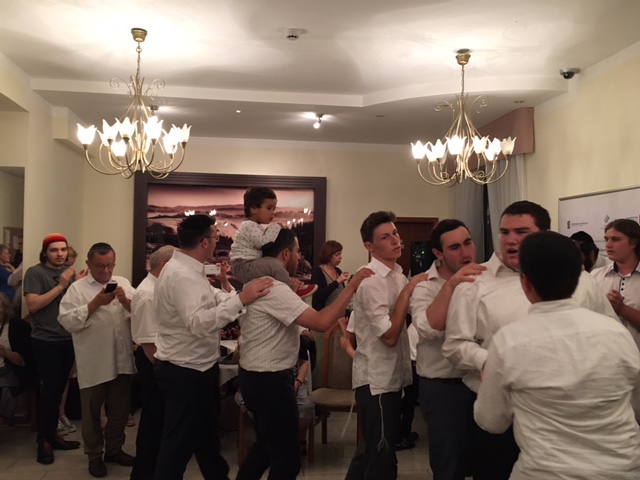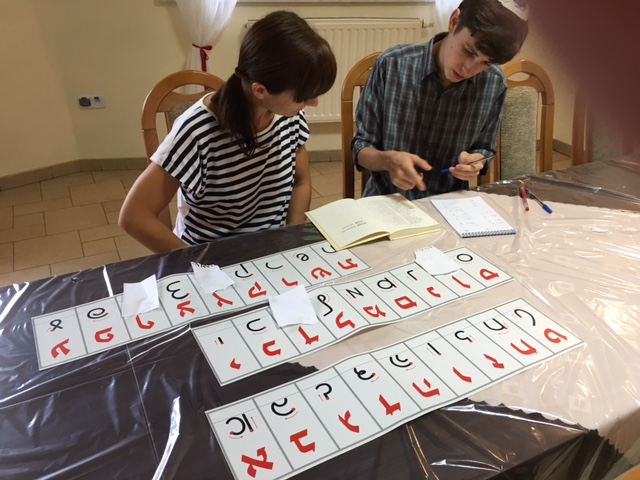
Jason Blatt, CJ Glicksman, Eli Kahn and Shimmy Mandelbaum have just returned from Poland after serving as much-valued, energetic volunteers for The Lauder Foundation’s Educational Summer Camp. Back for their second visit to the former Eastern-bloc nation, they first visited Poland this past March as part of the “Names, Not Numbers” (NNN) senior elective course at Yeshiva University’s MTA High School.

NNN@MTA is a widely recognized oral history project that teaches students about the Holocaust. This was the first year the course incorporated a trip to Poland, which 21 out of the course’s 30 students joined. While in Poland, the group spent Shabbat in Krakow at the Ronald S. Lauder Foundation’s annual Shabbaton. The foundation, which offers online Jewish education throughout Poland, attracts Polish Jews of all ages, from all backgrounds. The students made a tremendous impact on the participants and stayed with the program and joined the group for an additional melava malka together. The uplifting atmosphere prompted the director, Rabbi Mati Pawlak, to invite the students to volunteer at The Lauder Foundation’s Educational Summer Camp. Blatt, Glicksman, Kahn and Mandelbaum accepted the invitation.

Approximately 180 people attend the camp from various backgrounds throughout Poland. The students engaged in teaching Hebrew language, siddur analysis and Jewish education. They also spoke to The Jewish Link about the NNN project, which initially introduced them to Jewish life in Poland. But beyond the educational component was the fostering of relationships and camaraderie. The warmth and admiration felt among the participants was palpable. Rebbetzin Hadassah Pawlak, the director of the Lauder Foundation’s on-line Jewish education program in Poland, the vice principal at the Lauder Foundation School in Warsaw and the organizer of the educational camp couldn’t say enough about the impact these boys had at the camp. “As soon as they arrived at the camp in Wisla, they started to teach Hebrew, Gemara and Jewish music. However, most remarkably because of their kindness, enthusiasm, their excellent middot and tons of positive energy, they were able to integrate with our diverse community and to become part of it,” Rebbetzin Pawlak said. “We may never restore lost lives, but we may bring back to life a community that was once destroyed and make a beautiful ending to a tragic story by ensuring its continuity for next generations. It can be achieved with the support of young adults like Jason, Eli, CJ and Shimmy who now also share their part in helping to build the Jewish community of Poland, giving hope to the next generations and strengthening the achdut (unity and togetherness) between Jews from all over the world.”
Tova Rosenberg, an educator who created NNN, now in its 13th year of operation, joined the program as a guest lecturer to speak about the project. She felt great pride in witnessing the MTA students interacting with all the people in attendance, young and old, representing different parts of the Jewish spectrum. “These alumni completed a great Jewish education encompassing so much. The fact that they had an opportunity to be a part of rebuilding Jewish life in Poland is truly inspirational,” Rosenberg expressed to The Jewish Link.
An Orthodox woman in her 20s who grew up in Poland and has since moved to Israel made a lasting impression on CJ Glicksman. She explained that to be Jewish in Poland one needs to make a real effort. “Living in Teaneck is sort of like being in a bubble. Jewish life is hassle-free and comfortable. I returned to Poland to explore a different type of Jewish life, one where it is challenging to maintain your Jewish identity on a daily basis,” Glicksman explained. The experience was eye-opening and alerted him to the juxtaposition of being Jewish in his world versus theirs. Still, he noted that Jews of all ages and backgrounds are committed to furthering the community and come together as a cohesive group in an effort to do so.
Reflecting on his experience at the Lauder Camp, Eli Kahn explained that one thing that took him by surprise was “how many Jewish people there are in Poland who actually want to be Jewish.” The Jewish community is very small, although more and more people are showing an interest in revitalizing Jewish life. “I think there are more Jews every day who are not just coming forward and saying they are Jewish, but rather they are proud to be Jewish.” Kahn said it was the atmosphere and the energy of the people he returned to Poland to work with that inspired him tremendously.
The students all agreed that the people they met while at the camp were the kindest and most caring people they have ever encountered. “I think part of the reason is that they don’t usually have the opportunity to meet unfamiliar Jews, so when they do, they feel so much love and excitement toward them,” Glicksman told The Jewish Link. The Jews in Poland feel isolated from the worldwide Jewish community. Glicksman believes that he along with his classmates who volunteered at the camp reinforced the importance of a united Jewish population across the globe.
The students remarked how this trip to Poland made them realize how fortunate life at home really is. They live in an environment where it is easy to be Jewish. From yeshivas to synagogues and kosher food, everything is extremely accessible. It ignited an urge to give back to people who don’t necessarily have it as easy. Furthermore, it provided a catalyst to be involved in communal Jewish life here in the States. The world is a large place but at the same time quite small. The idea of working toward the improvement of a global communal Jewish life is extremely gratifying and now very close to the hearts of these young men who gave of themselves to improve life for others.
By Andrea Nissel













